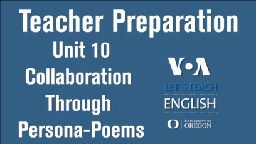 Video Transcript Video Transcript
Narrator: In this lesson, students learn how to write a poem. They use a
format the
teacher calls a “persona poem.” Students work in groups to create poems
about each other. The students learn that not all poems have to rhyme. |
|
|
Teacher: Can anyone tell me what a poem is? Julia.
Julia: A kind of writing?
Teacher: Yes! What else? Maryam?
Maryam: It has words that sound the same at the end of some of the lines.
Teacher: Good! Does anyone know a poem? Emma.
Emma: Roses are red. Violets are blue. Sugar is sweet. And so are you.
Teacher: That’s a great example.
Maryam: Yes, "blue" and "you" sound the same.
Teacher: Right. We call that a rhyme. Today we are writing persona poems
about
each other.
Jamie: Do we have to make rhymes?
Teacher: No. Our poems do not need rhymes.
Jamie: Oh, good. Because I can’t think of any rhymes.
(The teacher and students laugh together.)
Teacher: Okay, let’s begin. What's my first name?
Maryam: Alice?
Teacher: Okay.
(The teacher writes "Alice" at the top of the worksheet on the poster.)
Teacher: Can you think of four words that describe me?
Julia: Tall.
Jamie: Nice!
Teacher: Thank you!
(The teacher continues to add information to the poster.)
Teacher: Okay, now work in your groups. Write your persona poems for each
other.
(Maryam turns to Julia as they begin a persona poem about Emma.)
Maryam: Now we need four words to describe her.
Julia: How about fun and pretty? Do you have a sister?
Emma: Yes. Her name is Marie.
Maryam: What are three things that you love?
Emma: I love chocolate and traveling and making videos.
Julia: What are three things that scare you?
Emma: Scary movies, old houses, and . . . what’s that animal that moves like
this?
With no legs?
(Emma wiggles her hand and arms like a snake.)
Maryam: Snake?
Emma: Yes, snakes.
Maryam: They scare me too!
Jamie: Okay, your name is Mimi.
Julia: What are three things that you want to see someday?
Emma: Our graduation and a woman on Mars and, uhmm . . .
Maryam: What about world peace?
Emma: Oh, okay!
Julia: Where do you live? Oh, I remember, France!
Emma: Yes, in Paris.
Maryam: And I know your last name is . . . Michel!
Emma: Right, Michel.
Julia: Look, now we have a persona poem!
Mimi: What do we do with our photos?
(Mimi holds up a photo of herself.)
Teacher: Let’s put our poems and pictures on the wall so we can see them
all.
(The poems and photos are mounted on the wall. The teacher and
students walk around the room and look at each other’s poems and
pictures.)
Teacher: Everyone did a beautiful job! Let’s hear some of the poems.
Maryam: I will read Emma’s.
Teacher: Okay!
Maryam: Emma. Fun, pretty, interesting, bright. Sister of Marie. Who loves
chocolate, traveling, making videos. Who is afraid of scary movies, old
houses, snakes. Who wants to see graduation, a woman on Mars, world
peace. Lives in Paris. Michel.
Teacher: Emma, please read another poem.
Emma: I’ll read Mimi’s. Mimi. Tall, healthy, cool, clever. Daughter of Koshka. Who
loves her cat, lions, food. Who is afraid of night, bears, airplanes. Who
wants to see Alaska, a famous bike rider, a job. Lives in Malaysia. Li.
(The teacher and students continue to walk around and look at the
poems.)
Narrator: This activity lets students use English creatively to develop
poems about
their classmates. The students display their work on a wall and do a
"gallery walk.” They walk around viewing or reciting each other's poems.
This is our final model class of the Let's Teach English series. Next week,
we will share the full student textbook, the teacher’s manual, and a final
video reviewing classroom management methods used in the series. |
|